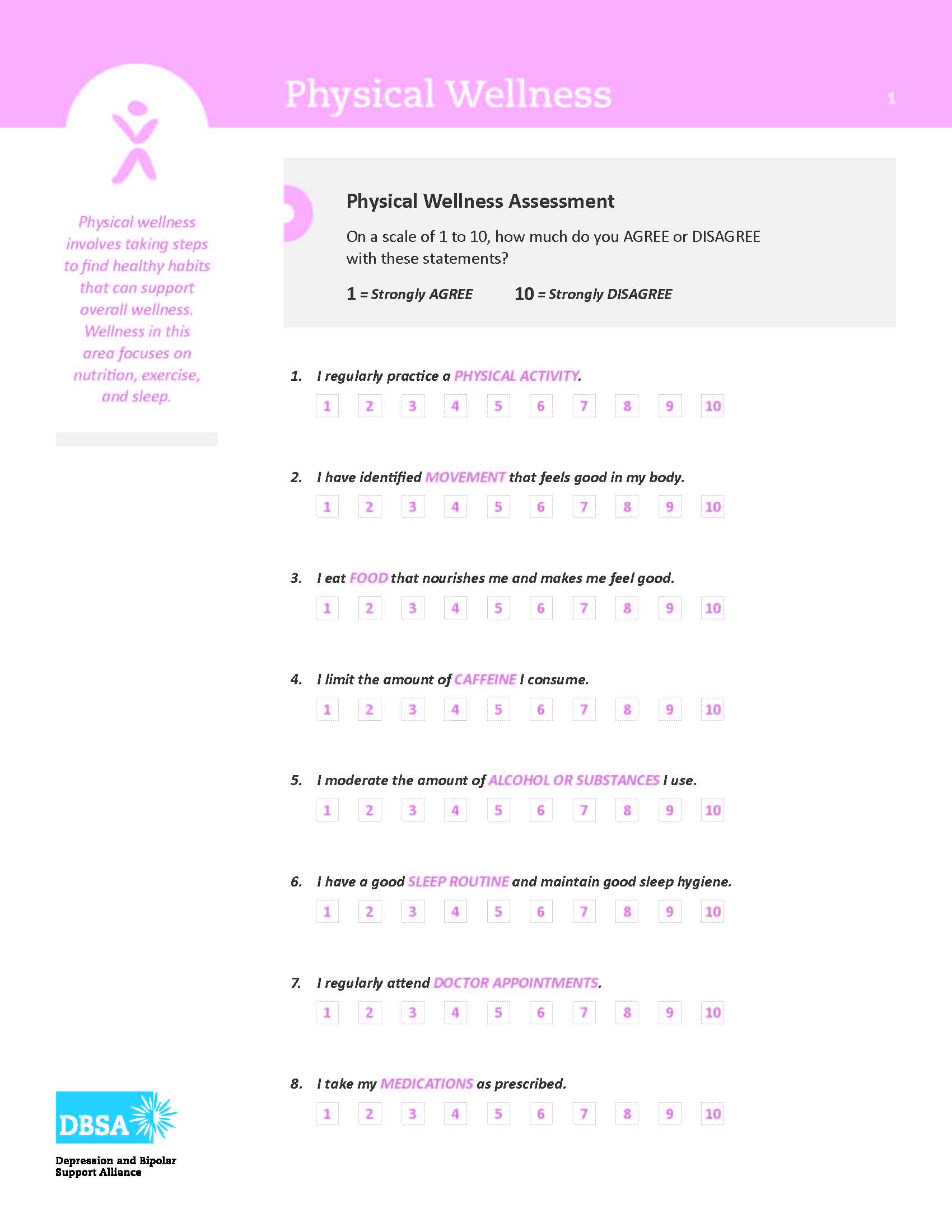Just as depression and bipolar disorder can affect your physical health, paying close attention to your physical wellness can improve your ability to live with a mental health condition. Here are suggestions that will help you look after your bodily health each day.
The importance of sleep
Have you noticed that being well-rested changes how you feel throughout the day? While everyone has different needs when it comes to sleep, most adults typically need between 7 to 9 hours each night.
- Sleep recharges your cognitive abilities and alertness. A clear head can assist with productivity during the day.
- Getting good sleep refuels our emotional wellbeing, which can help you react calmly to things that cross your path during the day.
Sleep hygiene
The term sleep hygiene refers to the set of habits that help you get the good, restful sleep you need. You may find that some techniques work better for you than others. Things that help many people include:
- Getting out of bed at a regular time each day.
- Developing a calming routine before bedtime.
- If you are lying awake and feeling more restless or agitated, get out of bed and do something relaxing – even boring – until you start to feel sleepy.
It takes time to find the right combination, but once you find the habits and tools that work well for you, try to use them consistently each night.
Napping
Need a nap during the day? If you tend to feel fatigued, napping can be a restorative habit if your schedule allows for it – but the amount of time you set aside is important. Because of the 4 sleep cycles our bodies go through during sleep, researchers say that it’s best to take either a brief nap (around 20 minutes) or allow a longer period (90 minutes). Choosing from these options will keep you from waking up groggier than you did when you first went to sleep.
How nutrition affects you
The food you eat is important in determining how you feel. Nutrition affects your health, energy, and sometimes your mood. The right combination of vitamins, minerals, amino acids, fatty acids, and fiber helps your body function at its best. You also need the right balance of proteins, carbohydrates, and fats to reduce the risk of chronic diseases.
Good nutrition is important for everyone, but you may find that being aware of what, when, how much, and sometimes why you eat is useful in managing how you feel on a day-to-day basis.
Finding your ideal eating strategy
How do you know what kinds of foods will help you feel your best? Unfortunately, there is no one-size-fits-all plan for diet and nutrition. The best thing you can do is be aware of how different kinds of foods affect your moods.
Some people find that excessive amounts of sugar, caffeine, alcohol, or chocolate are more likely to contribute to mood disturbances. Foods such as vegetables, fruit, oil-rich fish, and whole grains may be more likely to help you feel stable.
When you eat can be just as important as what you eat. Do you feel better when you eat 3 meals throughout the day, or when you eat smaller, more frequent meals and snacks? As with sleep, establishing routine and timing each can help keep your blood sugar from rising or falling dramatically, which can affect how you feel.
Crash diets
With so many new diet trends flooding our news feeds, it can be difficult to know what is truly healthy. You may find yourself fighting weight gain resulting from medications you take – a common and frustrating side effect. While crash diets that promise quick weight loss can be tempting, completely eliminating one kind of food, even fat, from your diet may have negative consequences for your mood and overall health. If you are looking for strategies to lose weight, be sure to talk with your doctor to create a plan that is safe for your specific needs.
Eating disorders
It is not uncommon for eating disorders to occur alongside mood disorders. An eating disorder is a separate health condition that requires its own treatment. If you notice a drastic change in your weight, a tendency to restrict what you eat or to binge-eat, possibly followed by purging (vomiting), get in touch with your doctor right away.
Knowing how much exercise you need
How many fitness plans have you seen on television or your social media feeds just this week? The flood of information can be overwhelming and daunting. First and foremost, recognize that the right amount of physical activity is different for each person. The right type of exercise for you is the type you can stick with over time. As with starting a diet, talk with your doctor before you begin a new exercise plan.
Adding movement to your day
Moving your body does not have to be exhausting or expensive. A short walk several times a week can help energize your body and clear your mind. Consider slowly working more physical activity into your daily routine.
Some ways to build movement into your day:
- Take the stairs instead of the elevator.
- Go for a walk or do some stretches during a break at work.
- Get off the bus or train a stop early and walk.
- Park your car at the far end of the parking lot.
- Bike to work or pedal around town to run errands.
- Housecleaning, gardening, and other chores can add healthy activity, too.
Classes and workout buddies can help you stick to your plan
Do you prefer group activities or team sports? Check with your local park district or community center for information about team sports, group fitness classes, or other activities that you might enjoy. This can be a great opportunity to not only feel good but also meet other like-minded people interested in maintaining healthy habits.
Knowing your body
Bedtime rituals for sweet dreams
Looking for ideas to quiet your mind and get more restful sleep? These practices are helpful to some people. Finding what works can take time, so be patient with yourself.
- Go to bed and wake up at the same time each day.
- Step away from your computer, phone, or TV at least an hour before bed.
- Cut off caffeine at a certain time in the day, or eliminate it altogether.
- Try drinking a warm, non-caffeinated mug of tea or milk before bed.
- Take a bath or shower to relax.
- Journal, read a book, or listen to an audiobook.
- Listen to music or sounds for meditation.
- Color or draw.
In addition to your routine, create a comfortable sleep space for yourself. This may include blackout shades or curtains, a white noise machine to mask sounds, and turning down the thermostat to keep your bedroom a little cooler while you sleep.
Keeping a food journal
If you want to improve your eating habits, you may find it useful to keep a food journal. Include everything you eat and drink, your physical activities, and your moods. When does stress trigger cravings? Where do you tend to indulge, and how do you feel afterward? This can help you anticipate your cravings and choose healthy alternatives over empty calories. If you notice that certain foods seem to cause mood changes, try avoiding them for a couple of days to see if you notice a change.
- What you drink is as important as what you eat. Too much caffeine can make you feel anxious or contribute to mood fluctuations. Alcohol can worsen depression, interfere with sleep, and make medications and treatments less effective.
- If you have frequent food cravings, distract yourself with a walk, a pleasant activity or a tall glass of refreshing water.
How stress affects your body
Everyone feels stressed from time to time. But if stress becomes a chronic or long-term problem, it can take a toll on emotional, mental, and even physical health. Learn more about stress, as well as some of the possible contributing factors. Knowing the signs and causes of stress can help you prevent and manage it.
Learn more about the effects of stress
Benefits of Breathwork
Breathing techniques can have a big impact on both physical and mental well-being. Different methods can help regulate stress, improve focus, enhance athletic performance, and even support better sleep.











